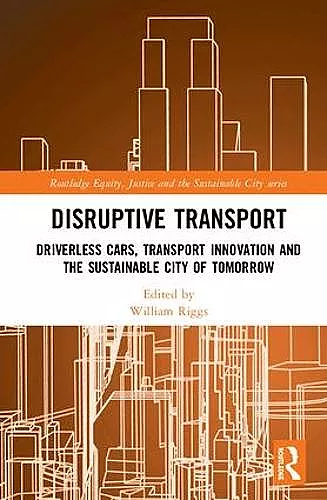Disruptive Transport
Driverless Cars, Transport Innovation and the Sustainable City of Tomorrow
Format:Hardback
Publisher:Taylor & Francis Ltd
Published:6th Dec '18
Currently unavailable, and unfortunately no date known when it will be back
This hardback is available in another edition too:
- Paperback£42.29was £46.99(9780367663926)

With the rise of shared and networked vehicles, autonomous vehicles, and other transportation technologies, technological change is outpacing urban planning and policy. Whether urban planners and policy makers like it or not, these transformations will in turn result in profound changes to streets, land use, and cities. But smarter transportation may not necessarily translate into greater sustainability or equity. There are clear opportunities to shape advances in transportation, and to harness them to reshape cities and improve the socio-economic health of cities and residents. There are opportunities to reduce collisions and improve access to healthcare for those who need it most—particularly high-cost, high-need individuals at the younger and older ends of the age spectrum. There is also potential to connect individuals to jobs and change the way cities organize space and optimize trips.
To date, very little discussion has centered around the job and social implications of this technology. Further, policy dialogue on future transport has lagged—particularly in the arenas of sustainability and social justice. Little work has been done on decision-making in this high uncertainty environment–a deficiency that is concerning given that land use and transportation actions have long and lagging timelines.
This is one of the first books to explore the impact that emerging transport technology is having on cities and their residents, and how policy is needed to shape the cities that we want to have in the future. The book contains a selection of contributions based on the most advanced empirical research, and case studies for how future transport can be harnessed to improve urban sustainability and justice.
"Billy Riggs has pulled together a talented team of cutting-edge practitioners and applied academicians to tackle a very timely topic: the paradigm shift already underway in transport. Much of the world is moving from a state of hypermobility to an even more seamless suite of travel options, thanks to self-driving vehicle technology. This book keeps the reader focused on ‘which way to go?’, as we arrive at this point of inflection: to more coordinated, affordable and efficient transportation systems, or more congested, more costly, less sustainable, and less healthy communities. Land development policies, vehicle ownership decisions, goods delivery, public and private budgets, and the sharing economy are central ideas here." — Kara Kockelman, Dewitt Greer Centennial Professor of Transportation Engineering, University of Texas, USA
"This book offers a great spectrum of insights and is an invaluable piece of thought-leadership in an era when everything seems to be possible but nothing is certain. Billy Riggs ensures we stay abreast of the different trends and perspectives, and makes city planning a very fun topic and an adventure into our own future!" — Sven Beiker, Lecturer in Management, Stanford Graduate School of Business, USA and Managing Director, Silicon Valley Mobility, LLC
"This volume holds the latest thinking from key leaders at the forefront of understanding the impacts autonomous vehicles will have on cities and regions. The approach is smartly broad, covering a wide range of issues we should all be considering - from land use and street design, to finance, municipal budgets and equity. Autonomous vehicles are much broader than a transportation issue and this book helps us all understand their far-reaching effects and how we can best prepare and shape the future ahead of us." — Nico Larco, Professor, Department of Architecture, University of Oregon, USA
"Disruptive Transport provides a great overview of the changes happening in today’s transportation world, and the opportunities to harvest the benefits from new technologies while limiting the potential negative impacts on our cities. Ridehailing, electric scooters, app-based shared mobility services and, in the near future, self-driving vehicles are quickly reshaping mobility, as well as individuals’ relationship with car ownership, activity scheduling and trip patterns, and the use of public space. Billy Riggs and his colleagues provide a deep dive into these topics, starting from the big picture of the changes already under way, to later explore the change at the city scale, before going back to "think big" in the final book section that focuses on opportunities for livability and sustainability of our communities. Featuring the contribution of many experts and real-world practitioners, the book is a very pleasant read – a fascinating trip into the future – which lays out important issues to consider in planning and policy making, and stimulates the readers to think at the future opportunities we have to change (in better) our cities and communities." — Giovanni Circella, Director, 3 Revolutions Future Mobility Program, University of California, Davis, USA
ISBN: 9781138613164
Dimensions: unknown
Weight: 498g
250 pages